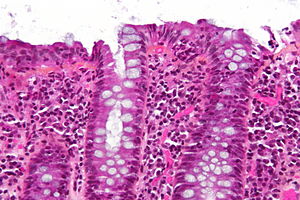Difference between revisions of "Lymphocytic colitis"
Jump to navigation
Jump to search
(+infobox) |
(+image,) |
||
| Line 1: | Line 1: | ||
{{ Infobox diagnosis | {{ Infobox diagnosis | ||
| Name = {{PAGENAME}} | | Name = {{PAGENAME}} | ||
| Image = | | Image = Lymphocytic colitis - hps - very high mag.jpg | ||
| Width = | | Width = | ||
| Caption = | | Caption = Lymphocytic colitis. [[HPS stain]]. | ||
| Micro = intraepithelial lymphocytes (>20/100 enterocytes), none or rare [[PMN]]s, no architectural distortion, | | Micro = intraepithelial lymphocytes (>20/100 enterocytes), none or rare [[PMN]]s, no architectural distortion, normal subepithelial collagen band (< 10 micrometres thick) | ||
| Subtypes = | | Subtypes = | ||
| LMDDx = [[collagenous colitis]], [[infectious colitis]] | | LMDDx = [[collagenous colitis]], [[infectious colitis]] | ||
Revision as of 00:12, 2 August 2013
| Lymphocytic colitis | |
|---|---|
| Diagnosis in short | |
 Lymphocytic colitis. HPS stain. | |
|
| |
| LM | intraepithelial lymphocytes (>20/100 enterocytes), none or rare PMNs, no architectural distortion, normal subepithelial collagen band (< 10 micrometres thick) |
| LM DDx | collagenous colitis, infectious colitis |
| Site | colon |
|
| |
| Associated Dx | autoimmune diseases (celiac disease, diabetes mellitus, thyroid disorders, arthritis) |
| Symptoms | diarrhea |
| Endoscopy | normal |
| Clin. DDx | irritable bowel syndrome |
| Lymphocytic colitis | |
|---|---|
| External resources | |
| EHVSC | 10184 |
Lymphocytic colitis, abbreviated LC, is a type of microscopic colitis. It has a characteristic clinical presentation and no apparent endoscopic changes.
General
Presentation:
- Chronic diarrhea, non-bloody.[1]
- Lymphocytic colitis may be related to collagenous colitis.
- It is hypothesized that these conditions may be the same pathology at different time points.[1]
Notes:
- Clinical DDx includes irritable bowel syndrome - which has no or subtle histopathologic changes.
Epidemiology
- Age: a disease of adults - usually 50s.
- Sex:
- Drugs are associated with LC and CC.
- NSAIDs - posulated association/weak association,
- SSRIs (used primarily for depression) - moderate association, dependent on specific drug.
- Associated with autoimmune disorders - celiac disease, diabetes mellitus, thyroid disorders and arthritis.[2]
- No increased risk of colorectal carcinoma.[2]
Treatment
- Sometimes just follow-up.
- Steroids - budesonide -- short-term treatment.[2]
Gross
- Endoscopic examination is normal.
- This is why it is called a microscopic colitis.
Microscopic
Features:
- Lots of intraepithelial lymphocytes (>=20/100 lymphocytes/surface epithelial cells[2]) and
- Lymphocytes in the lamina propria.
Significant negatives:[3]
- No neutrophils.
- No crypt distortion.
DDx:
- Infectious colitis - neutrophils present... not lymphocytes.
- Collagenous colitis - has a band of collagen below the epithelium.
Image:
Sign out
ASCENDING COLON, BIOPSY: - LYMPHOCYTIC COLITIS.
Micro
The sections show colonic mucosa with abundant intraepithelial lymphocytes (>20 lymphocytes/100 surface epithelial cells). The glandular architecture is within normal limits. No thickened collagen band is apparent below the epithelium.
There are no granulomas. No neutrophilic cryptitis is apparent. The epithelium matures appropriately to the surface.
See also
References
- ↑ 1.0 1.1 1.2 1.3 URL: http://emedicine.medscape.com/article/180664-overview. Accessed on: 31 May 2010.
- ↑ 2.0 2.1 2.2 2.3 2.4 Tysk C, Bohr J, Nyhlin N, Wickbom A, Eriksson S (December 2008). "Diagnosis and management of microscopic colitis". World J. Gastroenterol. 14 (48): 7280-8. PMID 19109861. http://www.wjgnet.com/1007-9327/14/7280.asp. Cite error: Invalid
<ref>tag; name "pmid19109861" defined multiple times with different content - ↑ http://hopkins-gi.nts.jhu.edu/pages/latin/templates/index.cfm?pg=disease1&disease=29&organ=6&lang_id=1